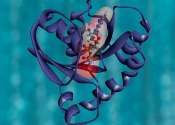Not wrapping but folding: Bacteria also organize their DNA, but they do it a bit differently
Some bacteria, it turns out, have proteins much like ours that organize the DNA in their cells. They just do it a bit differently. This is revealed by new research from biochemists at the Leiden Institute of Chemistry and ...








